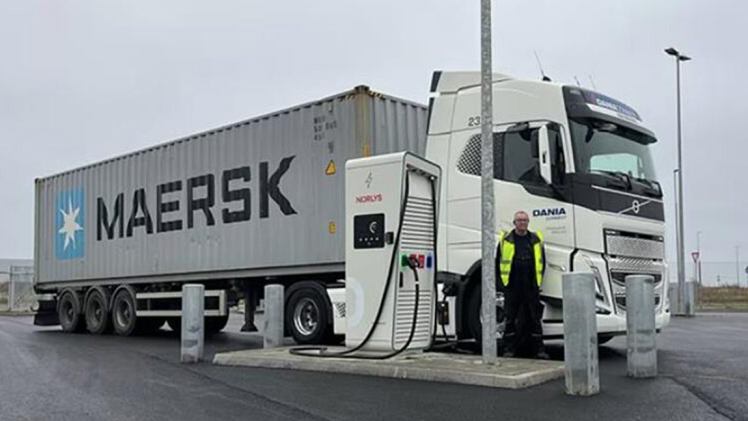The global logistics industry is undergoing a significant transformation as companies seek to reduce carbon emissions. Freight transport is a major source of greenhouse gas emissions, making green logistics increasingly urgent. Among the potential solutions, electric trucks are seen as a breakthrough, reshaping road transport and significantly cutting emissions.
Maersk, the world's largest container logistics and shipping company based in Denmark, is leading this trend by expanding its electric truck fleet in Europe. This expansion is part of a strategic partnership with Grundfos, a leading pump manufacturer and a company with strong environmental commitments.
The Grundfos partnership is part of Maersk's overall strategy to reduce emissions across its supply chain. The company aims for net-zero emissions by 2040, with interim 2030 targets to significantly cut carbon from its fleet, warehouses, and inland transport.
 |
Maersk invests in alternative energy for sustainable development, leading decarbonization in maritime logistics and now expanding into zero-emission road transport with electric trucks. Photo: TLI |
Maersk invests in alternative energy for sustainable development, leading decarbonization in maritime logistics and now expanding into zero-emission road transport with electric trucks. Photo: TLI
One focus of Maersk's plan is investing in alternative energy. The company has pioneered using biofuels, green methanol, and other clean energy solutions for shipping. With the development of electric trucks, Maersk is expanding decarbonization efforts to road transport.
The link with Grundfos is not just a practical step but also a model for future strategic partnerships. Maersk is actively seeking new partners and suitable transport routes to expand its electric truck network, gradually building a model that can be replicated across the logistics industry.
For Grundfos, this partnership continues its commitment to sustainable development, aiming for net-zero emissions by 2050 and achieving key targets before 2030. Integrating zero-emission transport into its supply chain shows how manufacturing companies can proactively minimize the environmental impact of their logistics.
The Maersk-Grundfos initiative demonstrates the feasibility of transitioning to green logistics. With tightening environmental regulations and increasing consumer expectations for sustainability, many companies will need to invest more in electric vehicles and low-carbon transport solutions.
One of the biggest current challenges is infrastructure. Unlike diesel trucks, electric trucks require a dense network of charging stations for long-haul journeys. Investment in fast charging systems, renewable energy grids, and battery technology will be crucial for the widespread adoption of electric transport.
Government support, from tax incentives and infrastructure funding to carbon pricing mechanisms, will also be key. All these can leverage sustainable logistics to become mainstream. The Maersk and Grundfos initiative exemplifies how businesses can actively promote the green transition, contributing to a zero-emission logistics industry.
The expansion of electric trucks in Europe is opening the door to cleaner and more sustainable transport. Maersk and Grundfos demonstrate that, through strategic partnerships and green technology investment, significant emissions reductions in freight transport are achievable. Despite the challenges, the shift to electric transport has begun and is irreversible.
Hai My (TLI)












